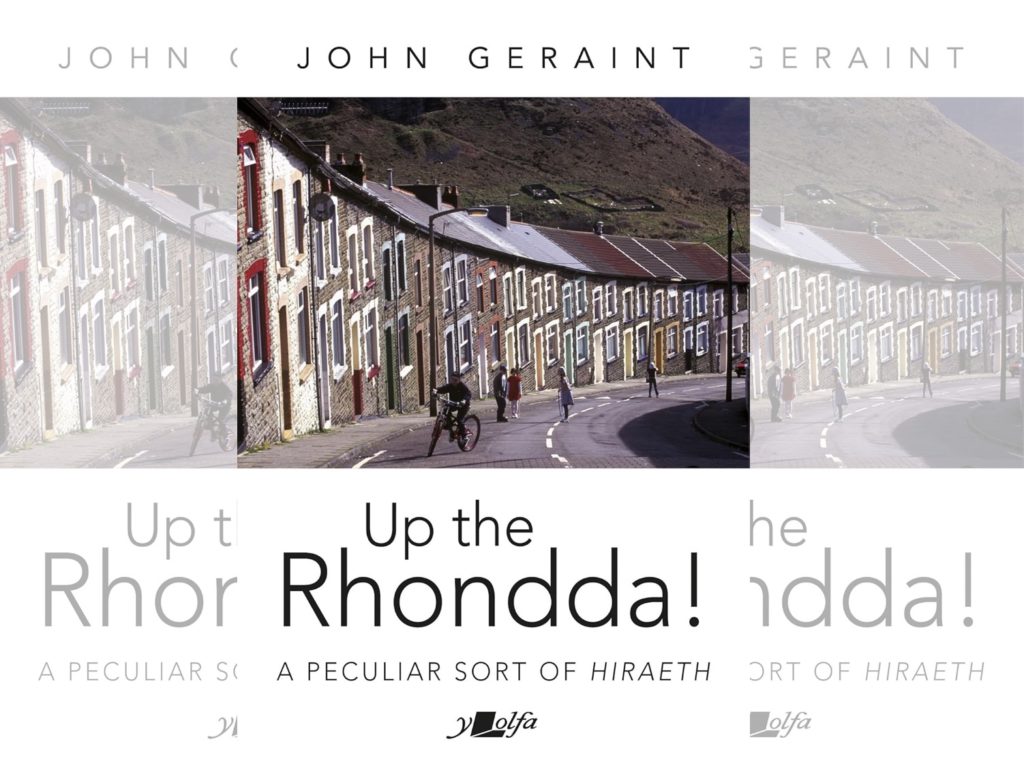Book review: Up the Rhondda! by John Geraint

Jon Gower
There are some Welsh stories that never cease to amaze. The story of Corona pop stands proudly in the pantheon. It tells of a self-described and starving medicine man from Galveston, Texas who turned up in a shop in Porth in the Rhondda. There he struck a deal for a square meal, offering in exchange for it the secret of making ‘mineral water the like of which your customers will never have tasted.’ And he was true to his word, giving the lucky shopkeeper the alchemical know-how to turn Welsh Hills Mineral Water into a pop that would prove to be astonishingly popular. In the 1940s Corona was selling 170 million bottles a year.
This bubbly tale is just one of the many lively essays in this thoroughly engaging and entertaining volume. They are based on the popular podcast series, John on the Rhondda in which the distinguished documentary-maker shares his love for a valley which in Victorian days enchanted travellers with its sublime beauty. This was soon to be replaced by ‘voracious, swaggering humanity’ as 150,000 souls and more poured into the area at a rate unmatched other than by New York and Chicago.
They created a place that was: “Full of character. Full of characters….The hwyl, the carnival of Valleys life. Brass bands and jazz bands, streaky snooker players and dead-eye darters, jokers and dreamers, painters and popsters, harpists and champion leek growers.” And the author manages to get more than a representative slice of this characterful humanity between the pages of the book.
And if you’re looking for a real character look no further than rugby flanker-cum-hooker Chris Jones, who played for Treorchy. He was banned for life not once but twice and would turn up for games with an axe in his kit bag before eventually discovering God in a police cell in Brecon.
With coal at its heart and as its fuel, the Rhondda soon grew to be a sort of linear city with state-of-the-art stadia and electric trams, top-notch entertainment halls and chapels standing cheek-by-jowl. And with two rivers, the Rhondda Fach and Rhondda Fawr and, thus, two valleys running side by side the author likes to think that, on a map, Rhondda presents ‘two fingers to the world.’
Geraint knows that map’s contours and climbs and suggests, with perhaps his tongue trying to be in both cheeks at the same time, that there are Rhondda mountain tops where you can stand with nothing between you and the Rockies on one side and the Urals on the other. It is perhaps far-fetched but consonant with a place that can seem so much larger than its twelve miles long stretch.
Insights
John Geraint is keen to share his knowledge and insights into the ways in which the Welsh language is both embedded and increasing in the places in which he grew up. He was born, like many others in Llwynypia, the Magpie’s nest, and much like that curious bird’s habit of collecting interesting objects, the author gathers many examples of interesting names.
One of the best is the etymology of the the name Trealaw. Alaw was the bardic name of David Williams, one of the prosperous owners who turned coal’s black diamonds into lots of money, some of which he spent on the land on which Trealaw stands today.
Treherbert, on the other hand is a little more prosaic, being named after one of the family names of the über rich Marquess of Bute and displacing the far lovelier Cwm Saerbren. But Rhondda locals seem to have exacted their poetic justice for this apparent name-theft when they would refer to someone who was a little dull as ‘a bit of a Herbert.’
Names
John Geraint similarly has a bit of fun with translating some of the place names into English, so that the place where he grew up – Tylacelyn Rd, Penygraig, near Tonypandy becomes Hollyhill Road, Rocktop near Fullingmill Meadow. But when he’s not just playing with the words he gives us many neat little insights into the meaning of place-names: I, for one, never thought of Maerdy, a place synonymous with communism in the Valleys, as meaning ‘mayor’s house.’
And of course, there’s mention of a certain singer from Treforest, who is usually associated with Pontypridd, who started life as Thomas Woodward:
He began his singing career as the frontman for a band called Tommy Scott and the Senators. And if you don’t know what happened after that, you really haven’t been paying attention. He made a name for himself. Clearly, as I’ve been trying to explain, in Pontypridd, it’s not unusual.
But the Rhondda itself is unusual. Think of the many novelists it has produced or the harmonious quality of its male voice choirs. Think of the extent and enthusiasm of Rhondda Netball, rapidly becoming the biggest female sports initiative in Wales. Or the extraordinary find of a hoard of Celtic weapons and tools in Llyn Mawr, which included a cauldron so big you couldn’t wrap your arms around it.
All this and more is concertinaed between the pages of this forward-looking history, which uses the lessons of the past to anticipate the Rhondda’s future. And on every page, and in pretty much every paragraph, the author’s love for the place that shaped him shines through, as welcome as shafts of sun when the washing’s on the line, as essential as knowing what a community can give you when everyone is always ready with a cheery greeting or a ready catch.
Up the Rhondda! A Peculiar Sort of Hiraeth by John Geraint is published by Y Lolfa. It is available from all good bookshops.
Support our Nation today
For the price of a cup of coffee a month you can help us create an independent, not-for-profit, national news service for the people of Wales, by the people of Wales.





